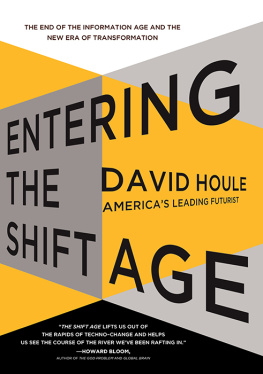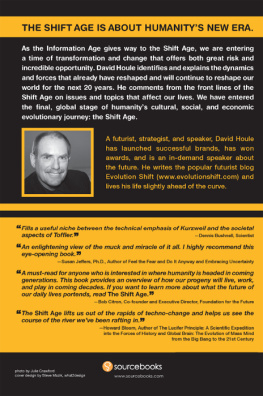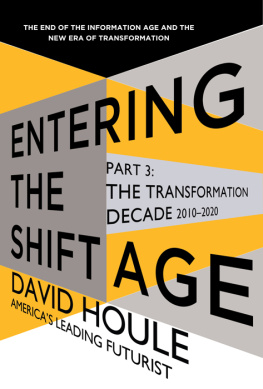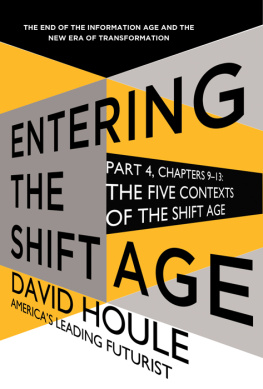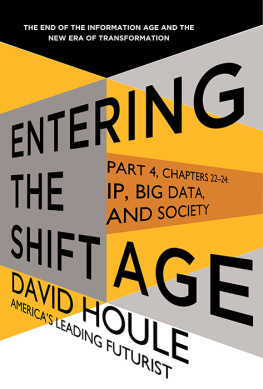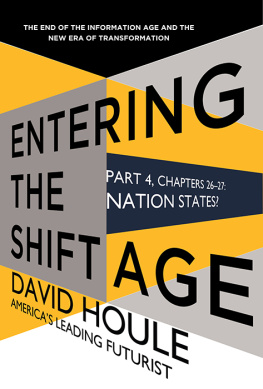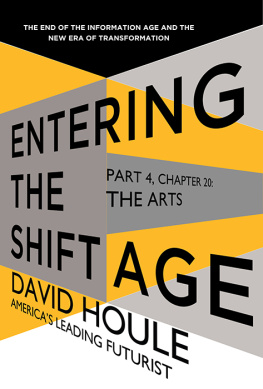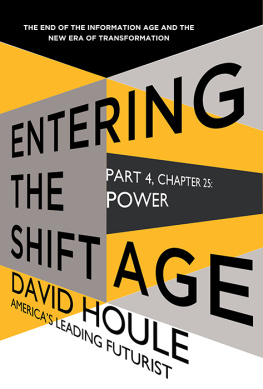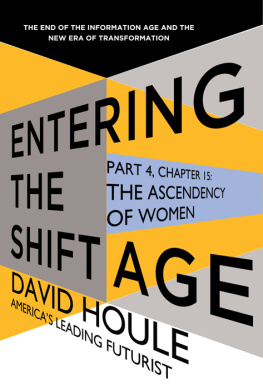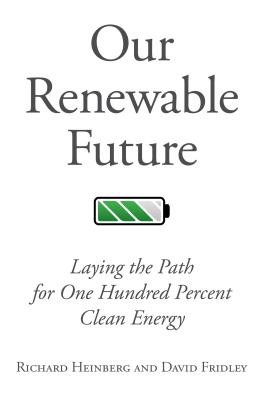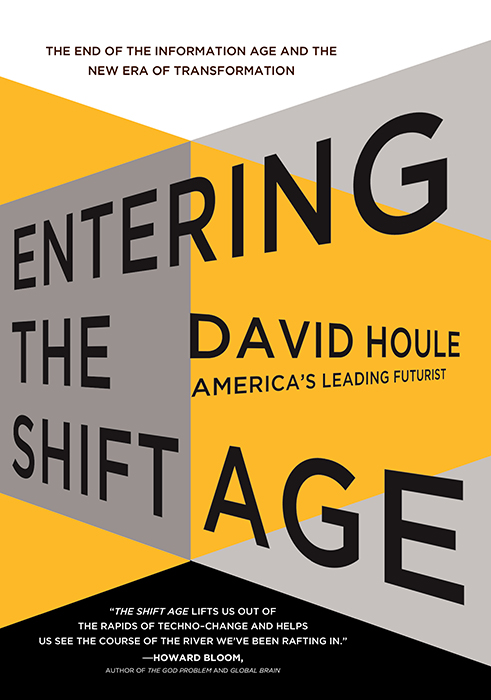
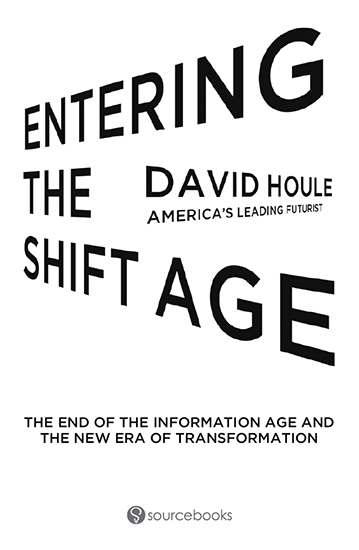
Copyright 2012 by David Houle
Cover and internal design 2012 by Sourcebooks, Inc.
Cover design by Studio Gearbox
Sourcebooks and the colophon are registered trademarks of Sourcebooks, Inc.
All rights reserved. No part of this book may be reproduced in any form or by any electronic or mechanical means including information storage and retrieval systemsexcept in the case of brief quotations embodied in critical articles or reviewswithout permission in writing from its publisher, Sourcebooks, Inc.
This publication is designed to provide accurate and authoritative information in regard to the subject matter covered. It is sold with the understanding that the publisher is not engaged in rendering legal, accounting, or other professional service. If legal advice or other expert assistance is required, the services of a competent professional person should be sought. From a Declaration of Principles Jointly Adopted by a Committee of the American Bar Association and a Committee of Publishers and Associations
All brand names and product names used in this book are trademarks, registered trademarks, or trade names of their respective holders. Sourcebooks, Inc., is not associated with any product or vendor in this book.
Published by Sourcebooks, Inc.
P.O. Box 4410, Naperville, Illinois 60567-4410
(630) 961-3900
Fax: (630) 961-2168
www.sourcebooks.com
Library of Congress Cataloging-in-Publication Data
Houle, David.
Entering the shift age : the end of the information age and the new era of transformation / David Houle.
pages cm
Includes bibliographical references.
1. Civilization, Modern21st century. 2. Social history21st century. 3. Social change. 4. Information society. 5. GlobalizationSocial aspects. I. Title.
CB430.H68 2013
910dc23
2012040062
CONTENTS
To Victoria, as we fell in love all
over again during the writing of this book.
PART 1
WELCOME TO THE SHIFT AGE
INTRODUCTION
Are you unsettled? Do you feel anxious about the future? Why does everything that used to work no longer work and the way that things used to be now feels long gone? Are things getting better or getting worse? Are your children coming of age at a wonderful time or a horrible time?
Well, the reason you may be feeling uneasy and asking these questions is due to the time we live in and the fact that we are at a major inflection point in human history.
We have left the Information Age and have entered a new age, the Shift Age. The Shift Age is and will be one of the most transformative times in all history. Almost everything in your life and every part of your life is in some relative rate of shift.
No wonder you are worried and anxious! Or you may be incredibly excited by the future rushing toward us. Either way, Entering the Shift Age is the book to better help you understand all the incredible change swirling around you. Consider this book your road map to the future.
This book also has a unique lineage.
In early 2006, I launched my futurist blog www.EvolutionShift.com with the tagline A Future Look at Today. The reason I started the blog was simple: I had a strong sense that humanity was entering a new agethat manifestations of this new age were everywhereand I felt the need to write about them.
The year before, when sensing that perhaps a new stage of humanitys development was underway, I went back and reread the futurists who had shaped my thinking, who, writing in the 1960s, 1970s, and 1980s, had been right about what was and would be happening in the decades ahead. These were the greats in my pantheon: Alvin Toffler and Marshall McLuhan first and foremost, along with Buckminster Fuller. Later John Naisbitt and Nicholas Negroponte wrote books built upon these greats. I even revisited the science fiction writers Arthur C. Clarke and William Gibson, as their fiction had become fact. What I found was that though these brilliant writers, particularly Toffler and McLuhan, had been incredibly insightful about the last quarter of the twentieth century, their clarity into the twenty-first century became a bit diffuse.
What was this next age? It was clear to me that the end of the Cold War, the globalization of the economy, the incredible force of the Internet, the astounding revolution in computing, and the explosive growth of cellular communications were ushering all of us into a new time that didnt yet have a name or conceptual shape.
As I researched, the word that kept coming up for me was shift. It seemed as though a profound shift was about to occur, that there were many shifts going on that were altering humanitys reality in significant ways. How we lived, how we thought, how we perceived the world, and even our consciousness were being altered. This shift was going to be so pronounced that it seemed nothing less than an evolutionary next step. Hence the name of the blog, EvolutionShift.
As I wrote one to three columns a week, two things happened. First, my constant study, observation, and reporting from the front lines of the shift helped to shape a larger, more cohesive view of humanitys next step. Second, my blog developed a following. This ever-increasing group of followers opened doors, and brought invitations to events and conferences and then to speaking engagements. As I was developing a sense of clarity of the future, people were asking me if I was writing a book, or told me that I had to do so. So I did.
Armed with good contacts, a good agent, and a book proposal, I approached the traditional book publishing industry, though with a great sense of conflict. Here I was, a futurist, knocking at the door of an industry that clearly was about to be eviscerated due to disintermediationand they didnt see it. The responses to my manuscript ranged from cold to ludicrous. Publishers said I was too optimistic, that the future was about apocalypse, that I needed to have the word trend in the title, that they already had a futurist so another one was not needed. One editor, Peter Lynch at Sourcebooks, liked my proposal but could not get unanimous agreement from the editorial committee at that time.
So, I turned to one of my favorite companies, Amazon, and had them publish The Shift Age in late 2007. On my blog I had forecast the coming explosive growth of ebooks, due to the probable development of a new eReader. Since this happened shortly before the Kindle was introduced, my book became available in print and ebook format by early 2008.
My life changed. Though The Shift Age never became a best seller in the traditional sense, it did become influential. The book made its way into the hands of CEOs, upper-level executives, and business owners. My speaking career took offwithin two years of the books first appearance on Amazon I had made some 150 speeches in several countries in North and South America. Heads of companies from around the world wrote me that the book had led them to alter the strategic vision of their enterprises. Audiences told me that my speeches changed how they looked at the world and gave them a context for understanding the scary upheaval all around them.
Simultaneously the crash of 2008 happened. Legacy thinking being what it is, most people I encountered before simply assumed we were still living in the Information Age. Now audiences were unsettled by the bursting of the housing bubble, the collapse of Lehman Brothers, and the unprecedented speed at which the world fell into the worst economic downturn in seventy years (due to the ever-increasing connectedness of the financial world). My view, that we had entered what would be a five-year reorganizational recession between two ages, was the first context that provided understanding. This great global recession was coincidental with the transition from one age, the Information Age, to the next age, the Shift Age. In times of uncertainty, having a path to understanding at least provides perspective, if not a line of credit or a secure job.

